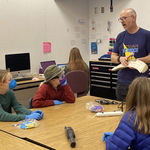Colossal Biosciences “Mammoth in the Classroom” Initiative, as Part of University of Alaska Fairbanks Adopt a Mammoth Program, Has Reached Its Initial Research and Adoption Goal
The Initiative Has Been Vital to Educating School Districts Across the State of Alaska While Also Dramatically Increasing the Radiocarbon Dating and Genetic Sequencing of Mammoth Fossils…Providing Invaluable Information About the Behaviors, Migration and Extinction of the American Woolly Mammoth
DALLAS–(BUSINESS WIRE)–In the largest initiative of American mammoth research ever conducted, Colossal Biosciences, the breakthrough genetic engineering and de-extinction company, in partnership with the University of Alaska Fairbanks, has announced that the first-of-its-kind “Mammoth in the Classroom” initiative has reached its initial research and adoption goal. Through this important initiative, which is part of the Adopt a Mammoth program, 55 mammoth fossils have been donated to school districts across the state of Alaska, allowing students to participate in this scientific discovery.
Additionally, Colossal Biosciences seeks to support the extensive research on American mammoths by radiocarbon dating and genetic sequencing of every mammoth fossil in the museum’s collection. When all is said and done, Colossal’s involvement and funding, in collaboration with the University, will help support the radiocarbon dating of approximately 1,500 mammoth teeth, tusks and bones, which currently exist in the University of Alaska Museum of the North’s collection. To date, 223 specimens of the 1,500 have been sampled, with 25 of the 55 adopted mammoth fossils radiocarbon dated. This is a significant accomplishment as prior to the project only about 10% of the fossils in University of Alaska Museum of the North’s collection had been radiocarbon dated and even less had been genetically sequenced (less than 1%). The identified dates have begun to suggest incredible findings about the behaviors, migrations, and extinction of the American woolly mammoths.
The “Adopt a Mammoth” project is led by mammoth researcher and Colossal Scientific Advisory Board member, Dr. Matthew Wooller, who is a Professor and director at UAF’s Alaska Stable Isotope Facility. The project is coupling crowd-sourcing, radiocarbon dating and ancient DNA sequencing techniques to study the UAF Museum of the North’s large collection of mammoth fossils. This project will ultimately shed light on the most recent mammoth that existed in mainland Alaska.
“Colossal’s ‘Mammoth in the Classroom’ initiative has helped us get closer to reaching our goal of classifying the mammoth fossils in our vast collection while also getting kids interested in science and ecology from an early age,” said Dr. Wooller. “Not only has this been a great opportunity for school kids in Alaska, but the research will help contribute to woolly mammoth education worldwide and an opportunity to identify some of the last surviving mammoths on the mainland, which has never been done before.”
Colossal Biosciences has gifted 55 school districts the adoption of a fossil. Adoption means the school district will have a chance to name their fossil and will have the results from the radiocarbon and ancient DNA testing shared with them. Samples from the fossils are taken by Dr. Wooller and sent to a lab in Sweden, led by another Colossal Scientific Advisory Board member, Love Dalén, professor of evolutionary genomics at the Stockholm University in Sweden, who offers free DNA analysis for each adopted specimen to determine its sex and other genetic characteristics. Colossal is collaborating with Dalén and team to do comparative genomics on all the specimens from the study. Dalén’s research is focused on the use of ancient DNA to investigate the evolutionary history of different species. His track record includes sequencing the first complete genomes of the woolly mammoth and woolly rhinoceros. In 2021, he led the team that sequenced the oldest DNA ever recovered, from mammoth remains that were more than one million years old.
“The radiocarbon dating of all these mammoth remains is providing us a fantastic opportunity to characterize the evolution of genetic diversity in North American woolly mammoths, and will ultimately provide a better picture of which genes were unique for this iconic species,” said Love Dalén.
The “youngest” dated woolly mammoth so far to be discovered in mainland Alaska is about 11,600 years old, but there are reasons to believe the massive animals were alive years following that discovery. As part of this initiative, the project hopes to confirm the “youngest” mammoth in America. Such a discovery would extend the date of extinction on the mainland to a period well after the earliest people arrived in interior Alaska.
“This initiative could not be more core to Colossal’s mission: combining cutting-edge de-extinction research with children’s education,” said Colossal Biosciences founder and CEO Ben Lamm. “The project is allowing us to contribute to the growth and understanding of mammoth research more broadly. Not nearly enough research has been completed on American woolly mammoths. This is not only a great benefit for our youth, but for the entire science community.”
For more information or to adopt your own mammoth fossil, please visit: https://sites.google.com/alaska.edu/adoptamammoth/home.
ABOUT COLOSSAL BIOSCIENCES
Colossal Biosciences was founded by emerging technology and software entrepreneur Ben Lamm and world-renowned geneticist and serial biotech entrepreneur George Church, Ph.D., and is the first to apply CRISPR technology for the purposes of species de-extinction. Colossal creates innovative technologies for species restoration, critically endangered species protection and the repopulation of critical ecosystems that support the continuation of life on Earth. Colossal is accepting humanity’s duty to restore Earth to a healthier state, while also solving for the future economies and biological necessities of the human condition through cutting-edge science and technologies. To follow along, please visit: www.colossal.com.
Matthew Wooller, Ph.D.
Mat Wooller is a paleoecologist who specializes in isotopic analyses of modern and past organisms, including the tusks and bones of mammoths. His studies of modern organisms have ranged widely to include analyses of whales, seals, bison, salmon and humans. He is a Professor at the University of Alaska Fairbanks, where he has directed the Alaska Stable Isotope Facility for about 20 years. Primarily focusing on the Arctic, Mat has used cutting-edge isotopic techniques to reconstruct past climates, ecosystems and the diets of some of the earliest people in Alaska. His lab’s isotopic analyses of a mammoth tusk were used to provide an unprecedented and detailed perspective on the movement ecology of a male, adult mammoth that was alive in Alaska at the height of the last ice age. He is also the founder and lead of the “Adopt a Mammoth” project that is coupling crowd-sourcing, radiocarbon dating and ancient DNA techniques to study the University of Alaska Museum of the North’s large collection of mammoth fossils in a hunt for the most recent mammoth that existed in mainland Alaska. As an open and collaborative paleo-ecological researcher, Mat integrates isotope techniques amongst a wide range of other approaches for studying the past, including analyses of ancient DNA, pollen, plant macrofossils, insect remains and his newly found interest in paleo-proteomics.
Love Dalén, Ph.D.
Love Dalén is a Professor of evolutionary genomics at the Stockholm University in Sweden, and one of the research leaders at the Center for Palaeogenetics in Stockholm. His research is focused on the use of ancient DNA to investigate the evolutionary history of different species. His track record includes sequencing the first woolly mammoth, Pleistocene wolf and woolly rhinoceros genomes. In 2021, he led the team that sequenced the oldest DNA ever recovered, from mammoth remains that were more than one million years old.
WEBSITE & SOCIALS
Websites: www.colossal.com
Twitter: https://twitter.com/itiscolossal
Instagram: https://www.instagram.com/itiscolossal/
LinkedIn: https://www.linkedin.com/company/itiscolossal/
Facebook: https://www.facebook.com/itiscolossal
Hashtag: #itiscolossal
Contacts
Media:
Emily.Mailaender@rcpmk.com




